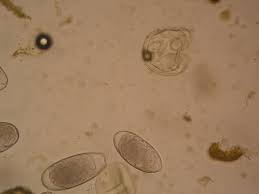
I was asked this question last week by a client that was feeling frustrated that recently their horse was having repeated high worm egg counts so in this week’s blog I thought I would explain some of the possible reasons why.
Worm egg counts detect the number of parasite eggs present in the horses faeces; the eggs are laid by worms living within the horse. The worm egg count is not a direct correlation of the number of worms the horse has but does give us an indication to the level of infection and amount of egg shedding.
We classify horses as one of three types of shedders; low (0-200 eggs per gram), medium (200-500 eggs per gram) and high (over 500 eggs per gram). In any herd, there will be a huge difference in the egg shedding between individual animals.
We know that 50-80% of the horses in a herd will be low egg shedders. This means that a small number of horses carry most of the worm burden. The aim of the worm egg count is to try to identify which those horses are as they will be the only ones that require treatment.
As long as a horse is in good health, there are good pasture management practices in place and the horse hasn’t recently moved fields, then the egg shedding status of an individual horse will usually remain stable. In other words, if they are consistently having low worm egg count results, they most likely will remain this way.
So, this week’s question was ‘why does my horse keep having a high worm egg count?’ and there are a few possible answers:
- 1. Your horse is part of the minority of horses that are persistently medium-high egg shedders-this is most likely if your horse is in good health, not young or old, you have good pasture management and haven’t moved yards or fields recently. These horses have a lower natural immunity to worms and are therefore more susceptible to them. To treat these horses, you need to adopt a targeted worming program based on worm egg counts and make sure you do a follow up worm egg count two weeks later to check for resistant worms. Unfortunately, it is likely that your horse will have persistent high worm counts and need more intensive worming than other horses in the herd.

- 2. Your horse is carrying resistant worms. Worms develop resistance to chemical wormers when they are over exposed to them. We have accelerated this issue due to previous worming strategies where horses were being wormed regularly all year round. If you have a problem with resistance on the yard, then the wormer will be less effective. Two ways to measure if this is the case is to perform a worm egg count two weeks after worming. You will know what your horses’ count was prior to worming and two weeks later it should be at least 80% reduced. If not, then there is a chance the worms are resistant to the wormer. Other important factors to consider is that you are giving the right amount of wormer and not underdosing and that your horse isn’t spitting any wormer out. Another way to assess for resistance is to look at something called the egg reappearance period. Every wormer will have a number of weeks that it is effective for, for example Equest lasts for 13 weeks. This means that for 13 weeks from giving the wormer you should have a low worm egg count. After 13 weeks the worm egg count will start to increase, and this is known as the egg reappearance period. If your horse is having high worm egg counts it is worth doing a repeat worm egg count just before the end of the period, the wormer given is effective for. If the worm count is creeping up, then this is a sign of resistance in the worm population. For example, if we repeated a worm egg count 11 weeks after giving an Equest wormer I would expect the horse to be a low shedder and still maintain an 80% reduction on the count prior to worming. An increase in this would suggest the wormer is not as effective due to resistant worms.

- 3. The third reason for persistent high worm counts is due to change in the horse’s situation or environment. Things to consider are health – anything that affects your horse’s health may impact on their immunity and increase their worm burden. Examples include equine cushings disease, stress, infections or any other cause of disease. Even if good pasture hygiene is being practiced, if your horse has moved fields it may be that the new field has a higher burden of worms in the grazing. Due to our milder winters worm larvae can survive as long as 9 months in the fields.
.
My top tips for trying to manage a horse that has a high worm egg count:

- Keep doing regular worm egg counts to monitor the shedding status of your horse.
- Get advice on the best type of wormer for your horse.
- Make sure you worm for the right weight.
- Perform a follow up worm egg count for resistance two weeks after worming and consider a further one to check the egg reappearance period.
- Keep field stocking densities low.
- Poo pick at least twice a week during the summer months, once weekly over winter.
- Ensure good biosecurity of new horses by checking their egg shedding status and make sure to check they are not bringing resistant worms to the yard.

Don’t forget if you’re on one of our Health Plans you get unlimited worm egg counts included in the plan and unlimited wormers!
As always if you have any questions please get in touch!
Jenny x
Veterinary Surgeon, Ridings Equine Vets Ltd

